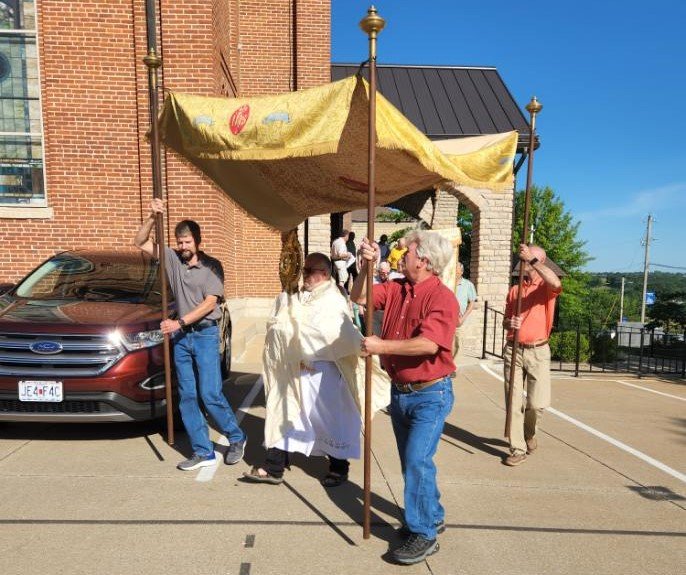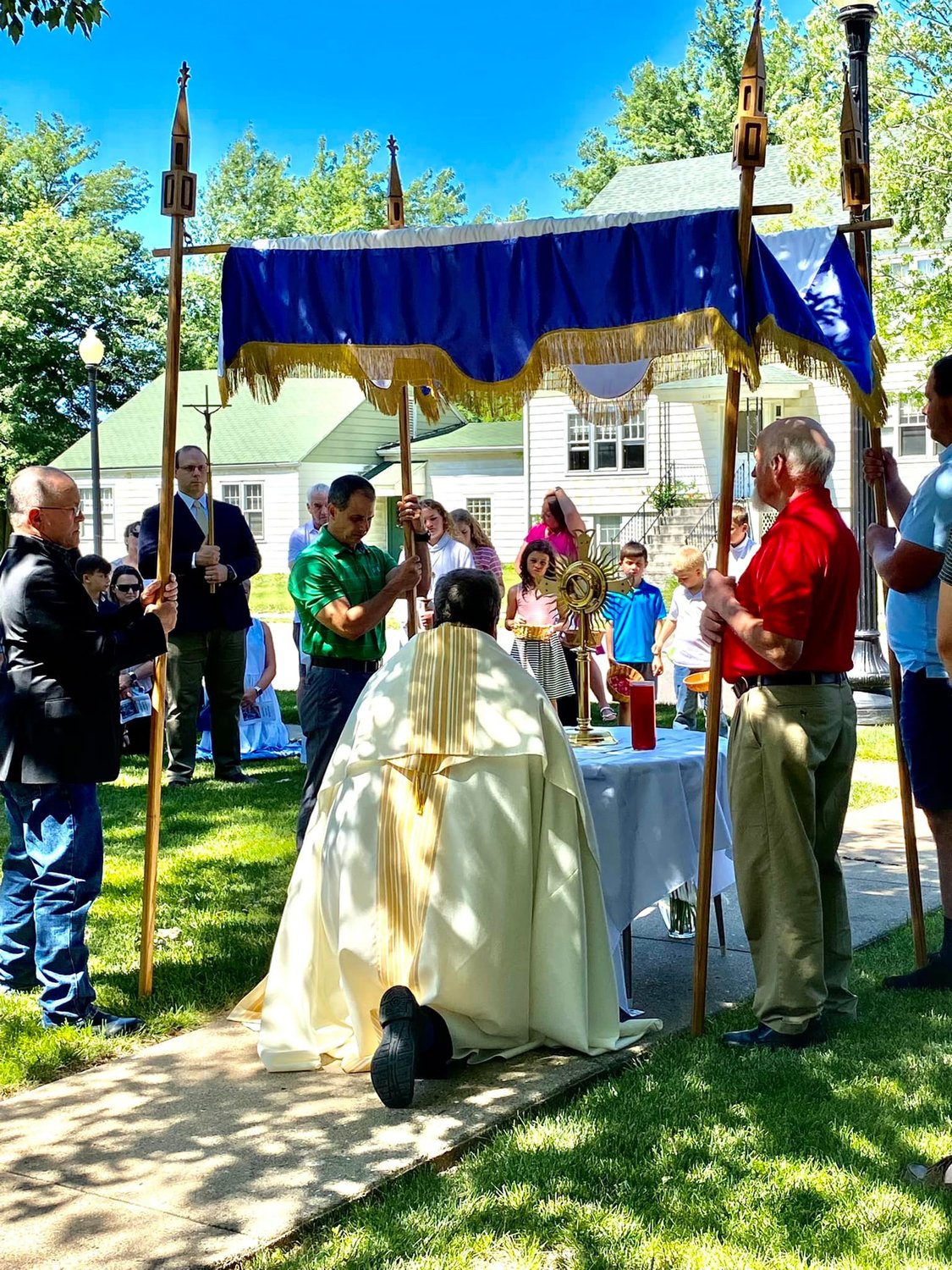Priests promote belief in the Real Presence on the Solemnity of the Body and Blood of Christ

SCROLL THE ARROWS to see more photos.
Jesus is never diminished or depleted, despite the complete giving of Himself at every Eucharist.
His intention is to be with His people always, fill them with His life and join with them as an everlasting gift to the Father.
“Remember, He promised us that not only would He and the Father send the Holy Spirit into the Church, but that He would be with us ’til the end of time,” Father Philip Niekamp proclaimed from the pulpit of St. George Church in Hermann.
“He is Emmanuel, the Eternal Word that became Incarnate,” the priest continued. “When we receive the Eucharist, we consume Christ, and in so doing He, by His grace, ‘consumes’ us!”
Fr. Niekamp, pastor of St. George Parish and of Church of the Risen Savior Parish in Rhineland, was one of a multitude of priests throughout the world who preached on the Real Presence of Jesus on June 19, the Solemnity of the Most Holy Body and Blood of Christ, often known as “Corpus Christi.”
“The Eucharist is the source and summit of our faith,” Fr. Niekamp noted. “(Christ) is all that we should strive to be. When He said, ‘Do this in remembrance of Me,’ He really became present in the Eucharist.”
This is a forceful, empowering presence, especially for people who choose to cooperate with the grace they receive.
“We are given the grace to be Christ in the world,” Fr. Niekamp pointed out. “When we care for the least in our society, when we are people of mercy, we make Christ present to others, as He is present to us in the Eucharist.”
“Wondrous circle”
Each year, Corpus Christi gives Catholics a prime opportunity to learn about, give thanks for and act upon Christ’s Real Presence in the Eucharist.
“We serve no bread, we serve no wine here! Only the Body and Blood of Christ!” Father John Schmitz proclaimed from the pulpit of the National Shrine of Mary, Mother of the Church, in Laurie.
He pointed out that Christ accepts ordinary gifts of unleavened bread and wine, presents them as a sacrifice to the Father, and gives them back to the people.
“And what happens? The same thing right here, today, as what happened at the Last Supper,” Fr. Schmitz declared. “The substance has changed; it’s no longer bread and wine. It has been changed into the Body and Blood of Christ.
“It will look, taste, smell and feel like bread and wine but it is NOT. It IS our God!” he stated.
The faithful who receive this tremendous gift should be filled with amazement and gratitude, each and every time.
“We respond with awe and wonder that our Lord and Creator, Savior and Son of God has been given to us — His very Body, Blood, Soul and Divinity to be taken into our humble souls, into our physical person and being,” said Fr. Schmitz.
Aware of the transformative power of this great sacrament, those who receive Holy Communion must carry that grace out into the world and continue the process.
“We give ourselves to God throughout the week,” said Fr. Schmitz. “And in gratitude, we come here again, we present the bread and wine made of the ingredients He has given to us, and again He makes it the Body and Blood of His Son, which the Son offers back to the Father in that one endless sacrifice of love, and then gives Himself to us so we can go out again and say, ‘Thanks!’
“It’s a wondrous circle of goodness and love,” said Fr. Schmitz.
“I am not worthy”
Fr. Schmitz pointed out that Jesus multiplying the loaves and fish in order to feed the 5,000, as told in all four Gospel accounts, foreshadows the Eucharistic celebration.
“It’s most miraculous in itself that at every Mass in the world since that first Holy Thursday thousands of years ago, Christ has multiplied Himself as Eucharistic food,” the priest noted.
As the people acknowledge before Holy Communion at every Mass, no one is worthy apart from God.
“But by God’s love and grace, by His care and all He does for us, He makes it possible for us to receive our Lord and Savior, His only Son, the Creator,” Fr. Schmitz noted.
“But we prepare ourselves the best we can,” he said.
The faithful are called at the beginning of Mass to pause and acknowledge their sins, “to prepare ourselves to celebrate the Sacred Mysteries.”
All who have committed venial sins are to call them to mind and ask God for forgiveness, right there.
All who are carrying the burden of mortal sin are to refrain from receiving Holy Communion without first receiving the Sacrament of Confession.
“If there’s a serious offense, carried out by our own free will, against our Lord, Who loves us, we need to go and ask for forgiveness from Christ and from our community of brothers and sisters,” Fr. Schmitz pointed out.
“He will forgive us, but it takes a little extra step,” he noted.
Sharing in divine life
Monsignor Marion J. Makarewicz VF addressed recent surveys indicating that a majority of people who say they are Catholic do not believe in the Real Presence of Christ in the Eucharist.
This lack of belief or understanding has contributed to a precipitous drop in the number of people who attend Mass each Sunday.
“We have quite a challenge before us,” Msgr. Makarewicz acknowledged from the pulpit of Mary Immaculate Church in Kirksville. “This isn’t just a crisis of faith in the Eucharist, but a crisis in the Christian faith and in the Catholic Church.
“We have to understand what it means to believe in God, in Jesus Christ, Whom He sent, and in the Holy Spirit, Who makes us one — and who we are as Church,” the priest stated.
“Because faith in the Eucharist — saying I believe that Christ is present, Body and Blood, Soul and Divinity, in the form of bread and wine, in the Eucharistic species — that’s a gift of faith,” he noted. “But you can’t get that gift of faith unless you’re present when it’s preached and celebrated.”
Msgr. Makarewicz is pastor of Mary Immaculate Parish and the Mission of St. Rose of Lima in Novinger.
He pointed to three actions that will help people understand their own role as followers of Christ: gather, offer and sacrifice.
Farmers and ranchers gather in their harvests, hopefully aware that God is the ultimate source of everything they are reaping.
People who harvest without such an understanding hoard what they believe to be solely the work of their own hands.
But those who reverently encounter God as the source of all good things are motivated to offer thanks and praise and to make a substantial, sacrificial gift back to its source.
“The bread and the wine and the offering placed at the altar symbolize our willingness to offer ourselves to God,” said Msgr. Makarewicz.
“And we join our sacrifice — the sacrifices we make each day when we go out and gather our resources, the hard work we put in and the willing heart that we offer to God on the altar — we join that with Christ’s perfect sacrifice,” the priest continued.
“That is the greatest and holiest gift — that we give of ourselves completely and totally, without counting the cost,” he said. “Because that’s how Jesus gave Himself on the cross and gives Himself in the Eucharist.”
Likewise, “who we are gets placed on that altar and is lifted up with Christ,” Msgr. Makarewicz pointed out. “A portion of ourselves is transformed through the bread and the wine into the Body and Blood, Soul and Divinity of Jesus Christ!”
That sacrifice on the altar then nourishes God’s people as they await the coming of Christ in glory.
“And in this Eucharist, by participating in this sacrifice of Christ, we share in the divine life of God!” said Msgr. Makarewicz.
“The same reality”
Many parishes continue the centuries-old ritual of carrying the Most Blessed Sacrament in procession through neighborhoods on the Solemnity of Corpus Christi.
One of those parishes is St. Vincent de Paul of Pettis County.
“In a joyful procession with song, Jesus will be carried in a monstrance by the priest, with a canopy, candles and incense for reverence, with our recent First Communicants in a place of honor, and with many faithful following,” Father Dave Veit, one of the pastors in solidum of the parish, wrote to parishioners.
“We will show others, especially those who in our own time are plagued by doubt in the Real Presence, our steadfast and full belief in the Eucharist — an act that will at the same time glorify God and strengthen our own relationship with Him.”
Father Anthony Onyeihe, associate pastor of Immaculate Conception Parish in Jefferson City, wrote that in the feeding of the 5,000, Jesus takes ordinary bread and forges it into a source of unity.
“This miracle tells us that the power of Jesus to nourish extends to every person and that Jesus unites all people as children of God,” he stated.
The multiplication of loaves was a clear foreshadowing of a much greater gift that was to come.
“The bread of the Eucharist, which is the true Body and Blood of Christ, nourishes and brings us together,” Fr. Onyeihe wrote.
“Each time we come to receive the Bread of the Eucharist, we receive nourishment from Christ,” he stated. “The Bread, which is the true presence of Christ, strengthens us so that we can avoid sin, face disappointments and sickness, and overcome sadness and despair.”
Father Leonard Mukiibi, pastor of St. Thomas the Apostle Parish in St. Thomas and St. Cecilia Parish in Meta, wrote that “Corpus Christi is not a remembrance of a past event but a participation, of being present, making present Jesus’s death on the cross and all that it means in this moment and place for us.
“We are just as present at the Last Supper and on Calvary as were the Apostles and the women — different times and different people but the same reality — the same offering of Jesus to the Father for our salvation,” the priest wrote.
“To do this in remembrance of Jesus is not reenacting but making present the same event which will always be a present event because Jesus is the same yesterday, today and forever,” Fr. Mukiibi stated.
Comments
Other items that may interest you
Services
The Catholic
Missourian
2207 W. Main St.
Jefferson City MO 65109-0914
(573) 635-9127
editor@diojeffcity.org







